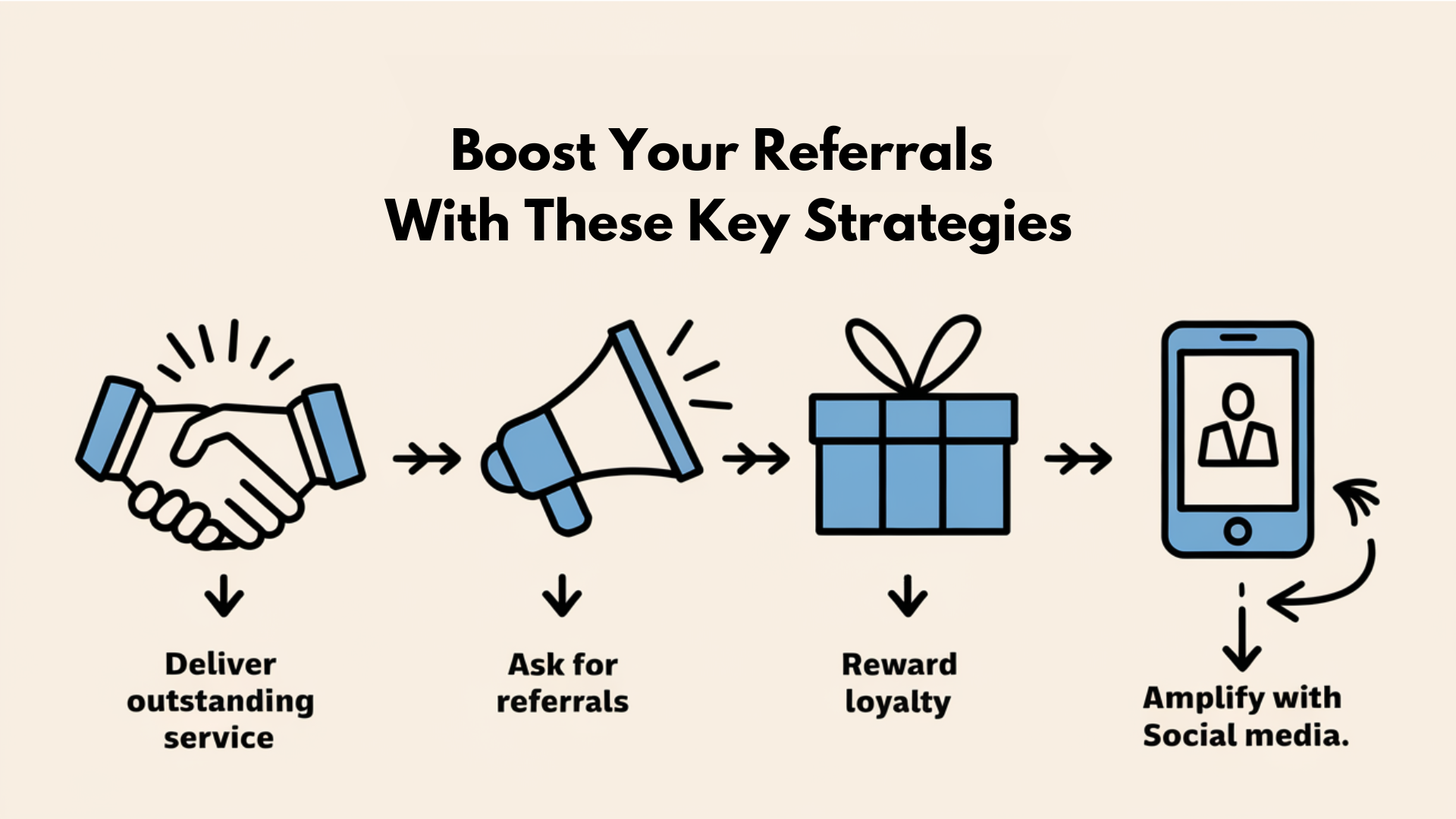Introduction
As a small business owner, you’re always searching for cost-effective ways to grow your brand. One of the most powerful yet underutilised strategies is referral marketing.
But can referral marketing work for your small business if you don’t have a large customer base? The short answer is: absolutely. In fact, small businesses often have a unique advantage when it comes to referrals, because they tend to build deeper, more personal relationships with their customers.
Let’s dive into why referral marketing can be a game-changer for businesses with limited clientele, and explore some unexpected ways to make it work.
Key Takeaways
- Referral marketing works even for small businesses with limited customer bases.
- Personal relationships with customers give small businesses a unique advantage in getting referrals.
- Offering incentives and leveraging digital tools can significantly increase referrals.
- Statistics show that referral marketing drives better-quality leads and higher retention.
Table of Contents
- What is Referral Marketing?
- The Small Business Advantage in Referral Marketing
- Can You Succeed Without a Large Customer Base?
- Key Strategies to Boost Your Referral Marketing
- Why Referral Marketing is Good For a Small Business
- Challenges and How to Overcome Them
What is Referral Marketing?
Referral marketing is a strategy well suited to a small business as it’s easy to encourage existing customers to refer new customers. Think of it as modern word-of-mouth, but turbocharged. It’s effective because recommendations from friends, family and existinng happy customers are trusted more than traditional ads. According to Nielsen, 92% of people trust recommendations from people they know over any other type of advertising.
The Small Business Advantage in Referral Marketing
Many small business owners believe that referral marketing only works if you have thousands of customers to generate buzz. But here’s the thing—small businesses often have the personal touch that large corporations can’t match. **Customer intimacy** can translate into a higher likelihood that your satisfied clients will recommend your services.
For example, a 2019 HubSpot study found that 71% of people are more likely to purchase after hearing a referral from a friend. And smaller, local businesses often cultivate closer relationships with customers, leading to more heartfelt, meaningful referrals.

Can a Small Business Succeed Without a Large Customer Base?
Yes! Here’s why:
- Quality Over Quantity: The value of your referrals isn’t in the number, but in the quality of each lead. A single, well-placed referral from a loyal customer can lead to long-term business. According to the Harvard Business Review, referred customers have a 37% higher retention rate than non-referred ones.
- High Conversion Rates: Referred leads convert 30% more often than leads from other sources (Deloitte). Even with fewer customers, the ones you do attract are more likely to purchase when they come from trusted referrals.
This increased retention is due to the nature of referral marketing itself. When someone is referred by a friend or family member, they enter the customer relationship with a higher level of trust and a positive impression of the brand. This positive experience often translates into longer-term loyalty and higher customer lifetime value.
Key Strategies to Boost Your Referral Marketing
- Personalization is Key
Small businesses can offer the personalized experience that big corporations cannot. One way to encourage referrals is to personally ask your best customers to refer others. It’s easy to overlook, but the power of asking directly can be substantial. According to Texas Tech University, 83% of satisfied customers are willing to refer others, but only 29% actually do—mostly because they’re never asked!
- Incentivise Your Customers
Offering incentives like discounts or freebies to customers who refer others can be a powerful motivator. Referral Candy reports that businesses with referral programs have **86% more revenue growth** over two years than those without.
- Leverage Digital Tools
If you’re concerned about managing a referral program manually, digital tools can simplify the process. Platforms like Referral Rock or Ambassador automate the tracking of referrals and allow you to scale, even if your customer base is small.

Why Referral Marketing is Good For a Small Businesses
64% of marketers say that referral programs are their most cost-effective form of customer acquisition (Influitive).
Customers who were referred by a friend have a 16% higher lifetime value (Wharton School of Business).
Businesses that use referral marketing grow 200% faster than those who don’t (Influitive).
FAQ’s
1. Can referral marketing really work for my small business if I only have a few customers?
Yes, absolutely! Even with a small customer base, referral marketing can be highly effective. The key is leveraging the close relationships you’ve built with your customers. Personal referrals from a trusted source often lead to higher-quality leads and better conversion rates. In fact, **referrals can convert 30% more often** than leads from other sources, meaning even a few referrals can make a big impact.
2. What types of incentives should I offer to encourage referrals?
Incentives can vary based on your business, but common examples include offering discounts, free products or services, or exclusive access to new products. The most important thing is to offer something valuable enough to motivate your customers to take action. Some businesses find success with tiered rewards, where the more referrals a customer provides, the better the incentive becomes.
3. Do I need expensive software to start a referral marketing program?
Not at all! While there are tools like Referral Rock and Ambassador that help automate and scale your program, you can start with simpler methods. Many small businesses successfully run referral programs by using **manual tracking** through spreadsheets or email. As your business grows, you may find it easier to switch to a referral software platform, but it’s not necessary to start.
Challenges and How to Overcome Them
While referral marketing can be a powerful tool for small businesses, it isn’t without its challenges:
- Getting Customers to Take Action: Sometimes, even loyal customers need an extra nudge. Create urgency with limited-time referral offers or add gamification elements.
- Scaling as You Grow: The more your business grows, the harder it can be to track and manage referrals. Investing in a referral platform early on can help as your customer base expands.
- Measuring ROI: Tracking the success of a referral program is crucial. Set clear goals and metrics like referral conversion rates and customer lifetime value.
Final Thoughts
Referral marketing is one of the most powerful and cost-effective strategies available for a small business, and the best part is, it doesn’t require a large customer base to be successful. By nurturing the relationships you already have, offering personalised incentives, and leveraging the right tools, even a handful of loyal customers can drive significant growth for your business.
The trust and credibility that come with personal referrals often lead to higher conversion rates, better customer retention, and ultimately, a stronger bottom line. So, don’t underestimate the potential of word-of-mouth. With a well-planned referral marketing strategy, your small business can thrive—one happy customer at a time.
Speak soon
Len
- Standard Operating Procedures: Your Ultimate Guide to Streamlining Business Efficiency - September 5, 2025
- Brutal Truth: Your Customer Perception Is Sabotaging Your Success (Here’s The Proof) - July 25, 2025
- The Counter-Intuitive Customer-Centric Culture Strategy That Changes Everything - July 11, 2025
